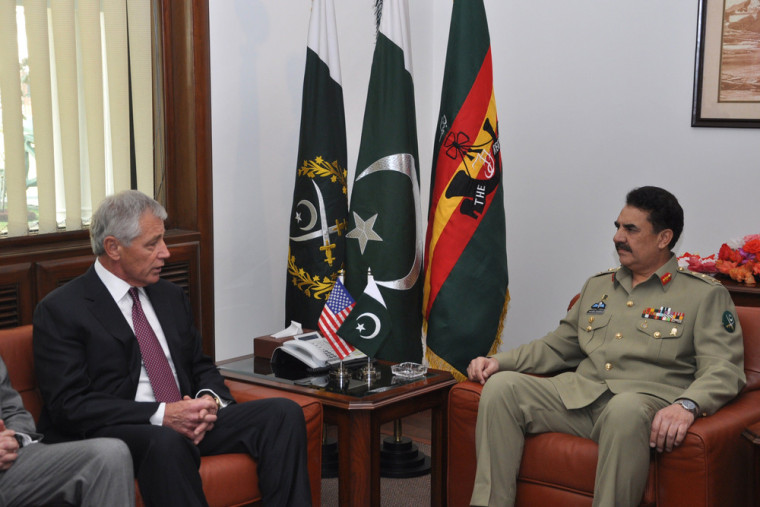
RAWALPINDI, Pakistan -- Defense Secretary Chuck Hagel discussed the use of U.S. drones against militants in remote areas of Pakistan on Monday during the first visit by a Pentagon chief to the South Asian ally in almost four years.
The United States has a complicated relationship with Pakistan and ties have been further soured by a dispute over unmanned military aircraft the United States uses to target militants in Pakistan's tribal areas on the Afghan border.
Islamabad says drone strikes kill too many civilians and violate its sovereignty. Protests by anti-drone activists prompted the United States to suspend ground shipments of NATO cargo leaving Afghanistan via Pakistan last week.
During his visit, Hagel met Prime Minister Nawaz Sharif and other senior officials including the newly appointed army chief, Raheel Sharif. Both sides were tight-lipped on the details of the talks.
"The prime minister ... conveyed Pakistan's deep concern over continuing U.S. drone strikes, stressing that drone strikes were counter-productive to our efforts to combat terrorism and extremism on an enduring basis," the foreign ministry said in a statement.
A senior U.S. defense official said Hagel hoped to work with Pakistan to deepen the security partnership and reassure it of continued U.S. assistance in building its military capacity.
The official, speaking on condition of anonymity, said the United States believed peace and stability in the region would be enhanced by improved Afghan-Pakistan relations, "because of the unique nature of its porous border and the presence of a variety of militant groups in the AfPak border region".
Pakistan is one of the largest recipients of U.S. foreign assistance and has received more than $16 billion in security aid since 2002, a defense official said. The Obama administration has sought $305 million in military aid for 2014 and $858 million in a range of civilian assistance for Pakistan.
Before his arrival in Pakistan, Hagel visited troops in Afghanistan and met senior Afghan officials. He said a NATO meeting in February could serve as a new deadline for approval of a security pact between Kabul and Washington -- an accord Afghan President Hamid Karzai has been reluctant to sign.
Hagel is the first defense minister to visit Pakistan since the U.S. raid in the city of Abbottabad that killed al Qaeda leader Osama bin Laden in 2011. Pakistan was embarrassed and angered by the surprise raid.
At the same time, Pakistan has served as a supply route for equipment flowing into Afghanistan to support the international coalition that is fighting Taliban militants.
The routes, known as the Pakistani Ground Lines of Communication (GLOC), are important for withdrawing U.S. and coalition equipment as they draw down foreign forces in Afghanistan and hand over security control to Afghan forces.
Prior to the talks, the defense official said Hagel would "express appreciation that ... the government of Pakistan has made it a priority to keep the GLOCs open".
He praised operations by Pakistani forces in a dangerous region this year to break up militants who posed a threat to the Torkham-Peshawar road that serves as part of the route between Afghanistan and the Pakistani port city of Karachi.
"That's an example of the kind of effort that the Pakistan government as a whole has taken to ensure that the GLOCs stay open," the official said.
Related:
- US stops cargo shipments on Afghanistan-Pakistan land route, citing fears about protests
- Three suspected militants killed in US drone attack in North Waziristan
- Pakistan political party outs alleged CIA station chief, seeks charges over drone strikes
- Nuclear-armed and coup-prone Pakistan appoints powerful new army chief